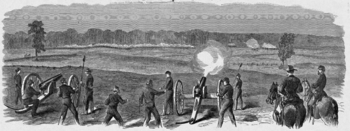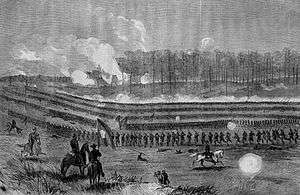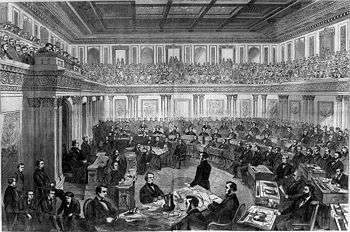Theodore R. Davis
| Theodore Russel Davis | |
|---|---|
| Born |
1840 Boston, MA |
| Died |
1894 Asbury Park, NJ |
| Nationality | American |

Theodore R. Davis (1840–1894) was a 19th-century American artist, who made numerous drawings of significant military and political events during the American Civil War and its aftermath.
Early Years
As a child, Theodore R. Davis was taken to Washington D.C. where he graduated from Rittenhouse Academy. When he was fifteen, he moved to New York where studied art under Henry W. Herrick and James Walker.[1]
War and Beyond
The Training Theodore Davis received under James Walker was informal. Davis typified certain artists as "special artists" was hired by popular magazines and newspapers. He was hired by them to illustrate the Civil War. He was hired by Harpers Weekly in 1861.[2]
During the Civil War, he served as a captain in the 15th Connecticut Volunteer Infantry. After the war, he became a companion of the New York Commandery of the Military Order of the Loyal Legion of the United States.
Some of these drawings include the Battle of Champion Hill, and the most significant sketch of General Joseph E. Johnston and General William T. Sherman meeting at the Bennett Farm near Durham Station to discuss the surrender terms of the remaining Confederate armies in the Southeast.
After the war when the Cyclorama in Atlanta was being painted, Davis was asked for his ideas having traveled with Sherman's army. He was later added to the painting.
Theodore Davis was a staff artist at Harper's Weekly.[3]
Many of his drawings were published as wood engravings in Harper's Weekly.
Theodore R. Davis was chosen to create the Haye's China with a chance meeting. Mr. Davis suggested using flora and fauna of the American decor. Mr. Davis would come to produce 130 different designs as of animals, plants, and scenic views.[4] At the time the cost for the order came out to $3,150. A guest named Clover Adams (a Washington D.C. Socialite) observed the when she ate at the White House she could hardly eat soup peacefully if she had to watch a coyote leap at her from behind a tree.[5]
At one point during the Civil war, Theodore Davis commanded a regiment but resigned because it interfered with his Art. While documentation the war he traveled with a British Journalist, stating that he worked for the London illustrated News, but did not. A major installment in his career was his documentation of the fight between the Merrimac and the Monitor. During the war, Theodore Davis was injured twice, and his horse was shot out under him[6]
Theodore Davis worked with panoramic painters such as Friedrich Wilhelm, and August Lohr on projects.[7] He worked alongside the men for larger pieces of artwork.
After the Civil War, Theodore Davis spent a short time Illustrating Reconstruction activities in the South and spent time with Generals George Armstrong Custer, and Winfield Scott Hancock during their campaigns against the Indians in the West.[8]
Selection of wood engravings from Harper's Weekly


 Pictures of the South --Barbecue at Augusta, Georgia, 1866
Pictures of the South --Barbecue at Augusta, Georgia, 1866
References
| Wikimedia Commons has media related to Theodore R. Davis. |
Davis, Theodore (artist). War and American Popular Culture: A Historical Encyclopedia. M. Paul Holsinger. Greenwood Press Westport Connecticut. London. Library of Congress Publishing Data. 1999 Theodore Russel Davis. The South on Paper: Line, Color, and Light. Essay by Estill Curtis Pennington and Essay and Catalogue by James C. Kelly. Copyright 1985. White House China Service http://www.whitehousehistory.org/press-room/white/house/china Fascinating First Ladies' & Fascinating Facts. http://www.firstladies.org/didyouknow.aspx Biography Theodore Russel Davis. http://www.wisconsinart.org/archives/artist/theodore-russell-davis/profile-902.aspx ©10/17/2007 Museum of Wisconsin Art, West Bend, Wisconsin © 2016, Museum of Wisconsin Art | 205 Veterans Ave. West Bend, WI | 262-334-9638 Visual Art in the Civil War. Sarah Tollman. https://francishistory.wikispaces.com/Visual+Art+in+the+Civil+War